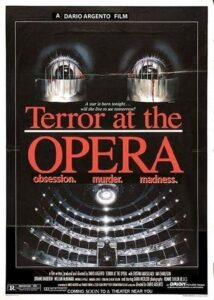OPERA (a.k.a. Terror at the Opera) **** Italy 1987 Dir: Dario Argento. 100 mins
 In Argento’s return to non-supernatural giallo, young, rising opera singer Cristina Marsillach gets the plum role of Lady Macbeth in Verdi’s cursed operatic MACBETH, shortly after the original leading lady is struck by a car. Soon after, a black gloved killer in a balaclava begins killing her associates, forcing her to watch as the murders are committed. More than most Argento movies, this suffers from weak performances and dialogue: Marsillach, who goes through Hell in the movie, is wooden in the lead – rarely seemingly more than a little flustered despite the horrors she witnesses. The real star is the filmmaker’s technique: in conjunction with cinematographer Ronnie Taylor, Argento delivers a stunning exercise in style over content as the camera swoops around the auditorium, tracks up and down winding staircases and endless corridors and frequently takes eccentric viewpoints, including a shot from the perspective of a plughole. The plotting rekindles the nuttiness of vintage giallo as the heroine is attacked, bound and gagged by the killer thirty minutes in and then held captive again at least twice before the fiery climactic confrontation with the killer. In a typically loopy Argento touch, the cops employ a murder of crows to help track the killer, an eccentric excuse for the show-stopping moment in which a key character’s eyeball is pecked out before Argento cuts to a crow attempting to swallow the extracted orb. The iconic image of OPERA is a sadistic giallo riff on A CLOCKWORK ORAGE in which the captured Marsillach observes the butchery of those she loves thanks to two rows of needles preventing her from closing her eyes. A witty slight at those who close their eyes at gory moments in horror movies, this unleashes some of Argento’s most spectacular murders: the one everyone remembers is the bravura keyhole shooting of Daria Nicolodi (as the heroine’s agent), though a grisly bit of business involving the retrieval of a swallowed piece of evidence has been borrowed by everything from SAW to DRAGGED ACROSS CONCRETE. There’s much to enjoy, though the tacked-on, silly Switzerland-set coda is perhaps the biggest misstep in Argento’s peak period.
In Argento’s return to non-supernatural giallo, young, rising opera singer Cristina Marsillach gets the plum role of Lady Macbeth in Verdi’s cursed operatic MACBETH, shortly after the original leading lady is struck by a car. Soon after, a black gloved killer in a balaclava begins killing her associates, forcing her to watch as the murders are committed. More than most Argento movies, this suffers from weak performances and dialogue: Marsillach, who goes through Hell in the movie, is wooden in the lead – rarely seemingly more than a little flustered despite the horrors she witnesses. The real star is the filmmaker’s technique: in conjunction with cinematographer Ronnie Taylor, Argento delivers a stunning exercise in style over content as the camera swoops around the auditorium, tracks up and down winding staircases and endless corridors and frequently takes eccentric viewpoints, including a shot from the perspective of a plughole. The plotting rekindles the nuttiness of vintage giallo as the heroine is attacked, bound and gagged by the killer thirty minutes in and then held captive again at least twice before the fiery climactic confrontation with the killer. In a typically loopy Argento touch, the cops employ a murder of crows to help track the killer, an eccentric excuse for the show-stopping moment in which a key character’s eyeball is pecked out before Argento cuts to a crow attempting to swallow the extracted orb. The iconic image of OPERA is a sadistic giallo riff on A CLOCKWORK ORAGE in which the captured Marsillach observes the butchery of those she loves thanks to two rows of needles preventing her from closing her eyes. A witty slight at those who close their eyes at gory moments in horror movies, this unleashes some of Argento’s most spectacular murders: the one everyone remembers is the bravura keyhole shooting of Daria Nicolodi (as the heroine’s agent), though a grisly bit of business involving the retrieval of a swallowed piece of evidence has been borrowed by everything from SAW to DRAGGED ACROSS CONCRETE. There’s much to enjoy, though the tacked-on, silly Switzerland-set coda is perhaps the biggest misstep in Argento’s peak period.
Review by Steven West



